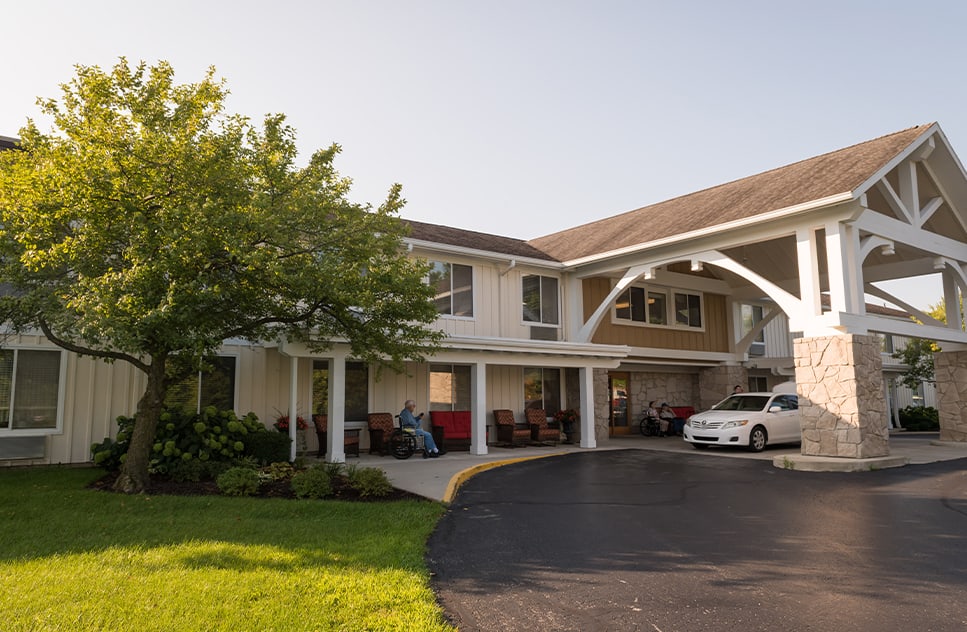Memory care is a specialized form of senior care designed to provide a safe and supportive environment for individuals with Alzheimer’s disease, dementia, and other memory-related conditions.
For caregivers, recognizing when it’s time to consider memory care for a loved one can be a challenging and emotional decision. When a loved one’s safety, health, and quality of life are at risk, even with your best efforts to help them, it may be time for memory care. Preparing for this transition is a huge step, but you’re not alone! There is support and knowledgeable help if you look for it.
What Is Memory Care?
Memory care offers specialized care designed to support seniors with memory impairments, such as those dementia can cause. These communities provide:
- Structured activities
- Trained staff
- Environments tailored to minimize confusion and ensure safety
Depending on the community, this can be achieved with features like secured entrances and exits, color-coded hallways, and individual memory boxes outside resident rooms to help seniors find their way around. But these features aren’t just to protect your loved one, they’re to help them feel at home.
These communities are designed to maintain independence while providing necessary support. In this way, we enhance the quality of life for residents by minimizing stress and maximizing comfort.
The importance of memory care cannot be overstated. It provides a specialized environment where seniors receive the attention they need, which can significantly improve their well-being and quality of life. Caregivers and family members also benefit from knowing their loved ones are in a safe and supportive setting.
Recognizing the Signs of Dementia
Dementia is a general term for a decline in cognitive function severe enough to interfere with daily life. It is not a specific disease but rather a set of symptoms that can accompany various diseases and conditions. Dementia affects memory, thinking, and social abilities, making it difficult for individuals to manage everyday tasks. The most common form of dementia is Alzheimer’s disease, but it can also occur from strokes, brain injuries, and other neurological conditions.
Identifying the right time for memory care involves recognizing specific signs and triggers. Here are some key indicators that it might be time to consider this option:
- Increased Forgetfulness: While some age-related memory issues are normal, if your loved one frequently forgets important events, names, or places, it may be a sign that their memory issues are worsening.
- Wandering: If they wander off and get lost, this poses significant safety risks and indicates the need for a secure environment.
- Aggression and Mood Swings: Noticeable changes in behavior, such as increased aggression or drastic mood swings, can signal that they require more specialized care.
- Difficulty Performing Daily Activities: Struggles with basic tasks like dressing, eating, and personal hygiene are strong indicators that additional support is necessary.
- Caregiver Burnout: If you, as a caregiver, are feeling overwhelmed or exhausted, it might be time to seek professional help.
Promptly recognizing these signs ensures timely intervention, which can greatly benefit both you and your loved one.

Deciding on Memory Care
Choosing memory care comes with its own set of advantages and challenges. On the positive side, specialized communities offer structured environments, trained staff, and community events that can improve the resident’s quality of life. However, the decision can also bring feelings of guilt and uncertainty.
If you’ve been watching over your parent, you may feel like this step is admitting you can’t care for them anymore. But the opposite is true! Understanding your limits means you’re putting their well-being before your ego. This way they can receive the support they need.
To make an informed decision, start with open family discussions. Ensure you consider your loved one’s preferences as much as possible. Also, consult with healthcare professionals to gain valuable insights into the best course of action.
Another crucial step is researching potential memory care communities. Look for places with positive reviews, experienced staff, and a good reputation. Visiting these communities can give you a better sense of the environment and the kind of care your loved one will receive.
Preparing for the Transition
Transitioning to memory care requires practical and emotional preparation. Start by finding the right community that meets your loved one’s needs. Consider factors like:
- Location
- Cost & budget
- Services offered
- The community atmosphere.
Financial planning is another key aspect. Memory care can be expensive, so explore options like insurance, government programs, and personal savings to cover the costs. Consulting with a financial advisor can provide strategies to manage these expenses effectively.
Emotionally preparing for the transition is equally important. Both you and your loved one may experience a range of emotions, from relief to sadness. Open communication, counseling, and support groups can help everyone involved cope with these feelings.
Even after your loved one has moved into memory care, your role as a caregiver doesn’t end. Staying involved in their care and maintaining regular visits can provide emotional support and reassurance. That’s why the community you choose is so important—because their well-being means the world to you.
Discover Memory Care in Fort Wayne
Recognizing when it’s time for memory care is a difficult but crucial step in ensuring the well-being of your loved one. By understanding the signs, navigating the decision-making process, and preparing for the transition, you can make this experience as smooth as possible for everyone involved.
Kingston Care Center of Fort Wayne is dedicated to providing a supportive and enriching environment for seniors with memory impairments. We invite you to schedule a visit and see firsthand how we prioritize the quality of life for our residents.
Join our community, where your loved one can receive the care and attention they deserve.






